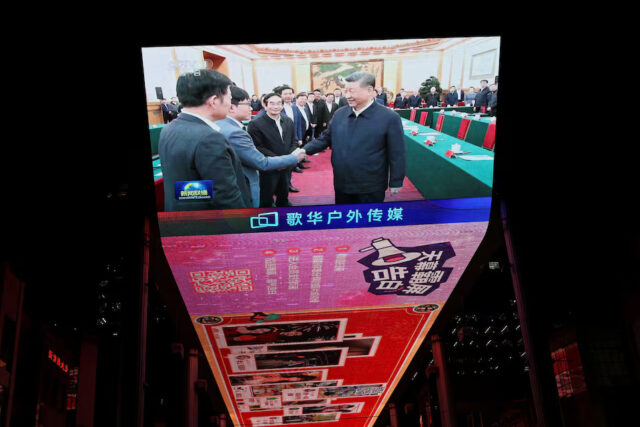
In 2018, President Xi Jinping hosted a rare meeting with entrepreneurs in Beijing, where executives from various industries, including high-tech and energy, were granted coveted front-row seats, though most were not widely known.
Fast-forward seven years and that line-up has changed markedly as Beijing buckles down to navigate a deepening technology war with the United States and celebrate powerful Chinese firms that have triumphed in the face of U.S. pressure.
On Monday, Xi mobilised to the frontlines a private sector battalion that included the founders of electric car maker BYD, tech giants Huawei, Alibaba, Tencent and Xiaomi, as well as AI start-up DeepSeek.
‘New Productive Forces’
The firms, most of which are giants in their sectors and controversial abroad, are key to achieving Xi’s belief that “new productive forces” are needed for China to escape its middle-income trap, compete with the United States and revitalise a stubbornly sluggish domestic economy, analysts said.
“The line-up of entrepreneurs suggests that Xi’s priority for the private sector is for it to support his goals of achieving technological self-reliance and supply-chain security,” said Neil Thomas, a fellow on Chinese politics at the Asia Society Policy Institute’s Center for China Analysis.
Indeed, the global and domestic backdrop for this week’s meeting stood in stark contrast to the situation in 2018, when growth was still robust and the geopolitical landscape had not deteriorated to the present point, despite a trade war with U.S. President Donald Trump during his first term.
By contrast, the symposium held that year drafted companies from across industries that included many smaller firms, such as software engineering firm Neusoft and car parts manufacturer Wanxiang. Tencent and Baidu attended, according to local media, but were not given front-row seats.
Growing Powers
“It’s a hard pill for them to swallow, but compared to 2018 they are now recognising that these Chinese tech companies’ contribution to economic growth is greater than they previously believed,” Alfredo Montufar-Helu, head of The Conference Board’s China Center, a think tank, said.
In the highly choreographed meeting, Xi urged the tycoons to “show their talent” and be confident in the power of China’s model and market, while ensuring that private companies could compete on equal terms with state-owned companies.
“The new line-up of entrepreneurs that Xi met with represent the cutting-edge technology that Beijing wants to see succeed to drive new economic growth,” said Paul Triolo, partner and technology policy lead for DGA-Albright Stonebridge Group.
Seating Priorities
Beijing has been focusing more on the private sector in recent months amid efforts to revive a struggling economy weighed down by a years-long property market slump and sluggish consumer spending.
The tech champions at Monday’s meeting suggest that Xi is rallying troops from the business sector to fight a geopolitical battle rather than to signal a strategic structural shift in the way Beijing manages the economy.
“It’s a recognition from the Party leadership that despite their preference for a state-centric approach to the economy, private companies can play a major role in the realization of China’s strategic priorities, including vis-a-vis the building of technological self-reliance,” Montufar-Helu said.
“And the Party intends to leverage this to innovate itself free from export controls and tech restrictions.”
The seating of executives at such key meetings is seen as illustrating companies’ standing. Huawei’s founder Ren Zhengfei and BYD’s Wang Chuanfu sat opposite Xi.
Beijing Embracing Private Sector
Alibaba’s Jack Ma and Tencent’s Pony Ma, among the biggest targets of Beijing’s previous private sector crackdown, were also seated in the front row. Wang Xing, founder of China’s largest delivery platform, Meituan, sat in the second row.
The presence of Alibaba’s Ma, who shook hands with Xi, was seen by many as the rehabilitation of a tech leader who largely withdrew from public life after authorities halted the IPO of his fintech company Ant Group in 2020.
Another notable face was Liang Wenfeng, founder of DeepSeek, whose rapid rise has sent shockwaves through global markets since it unveiled a new AI model last month.
The founder of Chinese search engine Baidu was not spotted at the meeting, sending its shares sharply lower on Monday.
Underscoring Xi’s commitment to private enterprises, the National People’s Congress Standing Committee is due to table a draft of the Private Economy Promotion Law at a meeting scheduled on February 24-25. It is expected to pass.
The legislation aims to create a legal environment that ensures equal treatment and protection of private companies.
“The symposium and the ‘Private Economy Promotion Law’ will have a positive impact on private sector confidence,” said Professor Zhu Tian of the China Europe International Business School in Shanghai. “But to sustain its impact, a more forceful fiscal and monetary stimulus policy … is also required to pull China’s economy out of the current deflationary spiral.”
Markets have cheered the meeting as a signal that private enterprise will be treated kindly and that the crackdown on tech giants is over. However, previous disappointments are fresh in investors’ minds and a brake on outright exuberance.
“We think President Xi’s support for innovation industries, ongoing macro policy support, operating performance, and other fundamental improvements will be crucial drivers of the China tech sector’s outperformance against the broader market from here,” analysts at UBS Wealth Management said in a note to clients.
Hong Kong’s Hang Seng tech index touched a three-year peak on Tuesday. Shares in Alibaba rose 2% after CCTV showed Xi shaking hands with founder Jack Ma.
(With inputs from Reuters)




